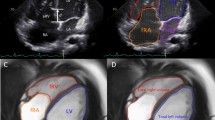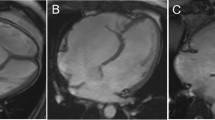Abstract
Ebstein’s anomaly (EA) is primarily diagnosed by echocardiography. The purpose of this study was to compare echocardiography and magnetic resonance imaging (MRI) in EA. Data from cardiac MRI and echocardiography were prospectively collected from 16 patients with EA. Imaging data also were compared with intraoperative findings. Information provided by MRI and echocardiography were comparable for left ventricular size and function, tricuspid valve repairability, qualitative assessment of right-sided cavities, and visibility of septal and anterior tricuspid valve leaflets. The posterior tricuspid valve leaflet and tricuspid valve fenestrations were better visualized with MRI; associated heart defects were equally recognized, apart from small shunts that tended to be more readily diagnosed with echocardiography. Quantification of right-cavity size and right ventricular ejection fraction was possible only with cardiac MRI. The degree of tricuspid valve regurgitation was underestimated by echocardiography (2 patients) and by MRI (4 patients) when compared with intraoperative assessment. When evaluating EA, echocardiography and MRI provide complementary data. For visualization of the posterior tricuspid valve leaflet and quantitative assessment of right ventricular size and function, MRI is preferable. For appropriate risk stratification in EA, both MRI and echocardiography should be performed before cardiac surgery.



Similar content being viewed by others
Abbreviations
- BSA:
-
Body surface area
- EA:
-
Ebstein’s anomaly
- LV:
-
Left ventricle, left ventricular
- LVIDd:
-
Left ventricular internal dimension at end diastole
- MRI:
-
Magnetic resonance imaging
- PWTd:
-
Posterior wall thickness at end diastole
- RV:
-
Right ventricle, right ventricular
- SWTd:
-
Septal wall thickness at end diastole
- TEE:
-
Transesophageal echocardiography
References
Perloff JK (2003) The clinical recognition of congenital heart disease, 5th edn. WB Saunders, Philadelphia, pp 194–215
Dearani JA, Danielson GK (2000) Congenital heart surgery nomenclature and database project: Ebstein’s anomaly and tricuspid valve disease. Ann Thorac Surg 69(4 Suppl):S106–S117
Attenhofer Jost CH, Connolly HM, Edwards WD, Hayes D, Warnes CA, Danielson GK (2005) Ebstein’s anomaly: review of a multifaceted congenital cardiac condition. Swiss Med Wkly 135(19–20):269–281
Attenhofer Jost CH, Connolly HM, Dearani JA, Edwards WD, Danielson GK (2007) Ebstein’s anomaly. Circulation 115(2):277–285
Edwards WD (1993) Embryology and pathologic features of Ebstein’s anomaly. Progr Pediatr Cardiol 2:5–15
Dearani JA, Danielson GK (2003) Ebstein’s anomaly of the tricuspid valve. In: Mavroudis C, Backer CL (eds) Pediatric cardiac surgery, 3rd edn. Mosby, Philadelphia, pp 524–536
Mann RJ, Lie JT (1979) The life story of Wilhelm Ebstein (1836–1912) and his almost overlooked description of a congenital heart disease. Mayo Clin Proc 54(3):197–204
Oechslin E, Buchholz S, Jenni R (2000) Ebstein’s anomaly in adults: Doppler-echocardiographic evaluation. Thorac Cardiovasc Surg 48(4):209–213
Patel V, Nanda NC, Rajdev S, Mehmood F, Velayudhan D, Vengala S et al (2005) Live/real time three-dimensional transthoracic echocardiographic assessment of Ebstein’s anomaly. Echocardiography 22(10):847–854
Shiina A, Seward JB, Edwards WD, Hagler DJ, Tajik AJ (1984) Two-dimensional echocardiographic spectrum of Ebstein’s anomaly: detailed anatomic assessment. J Am Coll Cardiol 3(2 Pt 1):356–370
Seward JB, Tajik AJ, Hagler DJ, Edwards WD (1984) Internal cardiac crux: two-dimensional echocardiography of normal and congenitally abnormal hearts. Ultrasound Med Biol 10(6):735–745
Eustace S, Kruskal JB, Hartnell GG (1994) Ebstein’s anomaly presenting in adulthood: the role of cine magnetic resonance imaging in diagnosis. Clin Radiol 49(10):690–692
Choi YH, Park JH, Choe YH, Yoo SJ (1994) MR imaging of Ebstein’s anomaly of the tricuspid valve. AJR Am J Roentgenol 163(3):539–543
Beerepoot JP, Woodard PK (2004) Case 71: Ebstein anomaly. Radiology 231(3):747–751
Didier D, Ratib O, Beghetti M, Oberhaensli I, Friedli B (1999) Morphologic and functional evaluation of congenital heart disease by magnetic resonance imaging. J Magn Reson Imaging 10(5):639–655
Chung T (2000) Assessment of cardiovascular anatomy in patients with congenital heart disease by magnetic resonance imaging. Pediatr Cardiol 21(1):18–26
Cantinotti M, Bell A, Razavi R (2008) Role of magnetic resonance imaging in different ways of presentation of Ebstein’s anomaly. J Cardiovasc Med (Hagerstown) 9(6):628–630
Lang RM, Bierig M, Devereux RB, Flachskampf FA, Foster E, Pellikka PA et al. (2005) Chamber Quantification Writing Group; American Society of Echocardiography’s Guidelines and Standards Committee; European Association of Echocardiography. Recommendations for chamber quantification: a report from the American Society of Echocardiography’s Guidelines and Standards Committee and the Chamber Quantification Writing Group, developed in conjunction with the European Association of Echocardiography, a branch of the European Society of Cardiology. J Am Soc Echocardiogr 18(12):1440–1463
Nagueh SF, Appleton CP, Gillebert TC, Marino PN, Oh JK, Smiseth OA et al (2009) Recommendations for the evaluation of left ventricular diastolic function by echocardiography. J Am Soc Echocardiogr 22(2):107–133
Jenni R, Oechslin E, Schneider J, Attenhofer Jost C, Kaufmann PA (2001) Echocardiographic and pathoanatomical characteristics of isolated left ventricular non-compaction: a step towards classification as a distinct cardiomyopathy. Heart 86(6):666–671
Maceira AM, Prasad SK, Khan M, Pennell DJ (2006) Reference right ventricular systolic and diastolic function normalized to age, gender and body surface area from steady-state free precession cardiovascular magnetic resonance. Eur Heart J 27(23):2879–2888 [Epub 2006 Nov 6]
Alfakih K, Plein S, Thiele H, Jones T, Ridgway JP, Sivananthan MU (2003) Normal human left and right ventricular dimensions for MRI as assessed by turbo gradient echo and steady-state free precession imaging sequences. J Magn Reson Imaging 17(3):323–329
Shiina A, Seward JB, Tajik AJ, Hagler DJ, Danielson GK (1983) Two-dimensional echocardiographic: surgical correlation in Ebstein’s anomaly: preoperative determination of patients requiring tricuspid valve plication vs replacement. Circulation 68(3):534–544
Gopal AS, Shen Z, Sapin PM, Keller AM, Schnellbaecher MJ, Leibowitz DW et al (1995) Assessment of cardiac function by three-dimensional echocardiography compared with conventional noninvasive methods. Circulation 92(4):842–853
McGowan JH, Cleland JG (2003) Reliability of reporting left ventricular systolic function by echocardiography: a systematic review of 3 methods. Am Heart J 146(3):388–397
van der Zwaan HB, Helbing WA, McGhie JS, Geleijnse ML, Luijnenburg SE, Roos-Hesselink JW et al (2010) Clinical value of real-time three-dimensional echocardiography for right ventricular quantification in congenital heart disease: validation with cardiac magnetic resonance imaging. J Am Soc Echocardiogr 23(2):134–140
Vettukattil JJ, Bharucha T, Anderson RH (2007) Defining Ebstein’s malformation using three-dimensional echocardiography. Interact Cardiovasc Thorac Surg 6(6):685–690 [Epub 2007 Sep 21]
Pothineni KR, Duncan K, Yelamanchili P, Nanda NC, Patel V, Fan P et al (2007) Live/real time three-dimensional transthoracic echocardiographic assessment of tricuspid valve pathology: incremental value over the two-dimensional technique. Echocardiography 24(5):541–552
Bharucha T, Anderson RH, Lim ZS, Vettukattil JJ (2010) Multiplanar review of three-dimensional echocardiography gives new insights into the morphology of Ebstein’s malformation. Cardiol Young 20(1):49–53 [Epub 2010 Jan 19.]
Hagler DJ, Tajik AJ, Seward JB, Schaff HV, Danielson GK, Puga FJ (1988) Intraoperative two-dimensional Doppler echocardiography: a preliminary study for congenital heart disease. J Thorac Cardiovasc Surg 95(3):516–522
Ritter SB (1991) Transesophageal real-time echocardiography in infants and children with congenital heart disease. J Am Coll Cardiol 18(2):569–580
Geva T (2006) Magnetic resonance imaging: historical perspective. J Cardiovasc Magn Reson 8(4):573–580
Hawkes RC, Holland GN, Moore WS, Roebuck EJ, Worthington BS (1981) Nuclear magnetic resonance (NMR) tomography of the normal heart. J Comput Assist Tomogr 5(5):605–612
Weber OM, Higgins CB (2006) MR evaluation of cardiovascular physiology in congenital heart disease: flow and function. J Cardiovasc Magn Reson 8(4):607–617
Puranik R, Muthurangu V, Celermajer DS, Taylor AM (2010) Congenital heart disease and multi-modality imaging. Heart Lung Circ 19(3):133–144 [Epub 2010 Feb 23]
Irwin RB, Luckie M, Khattar RS (2010) Tricuspid regurgitation: contemporary management of a neglected valvular lesion. Postgrad Med J 86(1021):648–655 [Epub 2010 Oct 18]
Marcotte F, Poirier N, Pressacco J, Paquet E, Mercier LA, Dore A et al (2009) Evaluation of adult congenital heart disease by cardiac magnetic resonance imaging. Congenit Heart Dis 4(4):216–230
Yoshimura N, Hori Y, Horii Y, Suzuki H, Hasegawa S, Takahashi M et al (2010) Comparison of magnetic resonance imaging with transthoracic echocardiography in the diagnosis of ventricular septal defect-associated coronary cusp prolapse. J Magn Reson Imaging 32(5):1099–1103
Klein SS, Graham TP Jr, Lorenz CH (1998) Noninvasive delineation of normal right ventricular contractile motion with magnetic resonance imaging myocardial tagging. Ann Biomed Eng 26(5):756–763
Sarkar D, Bull C, Yates R, Wright D, Cullen S, Gewillig M et al (1999) Comparison of long-term outcomes of atrial repair of simple transposition with implications for a late arterial switch strategy. Circulation 100(19 Suppl):IIl76–IIl81
Papavassiliou DP, Parks WJ, Hopkins KL, Fyfe DA (1998) Three-dimensional echocardiographic measurement of right ventricular volume in children with congenital heart disease validated by magnetic resonance imaging. J Am Soc Echocardiogr 11(8):770–777
Salehian O, Schwerzmann M, Merchant N, Webb GD, Siu SC, Therrien J (2004) Assessment of systemic right ventricular function in patients with transposition of the great arteries using the myocardial performance index: comparison with cardiac magnetic resonance imaging. Circulation 110(20):3229–3233 [Epub 2004 Nov 8]
Quinonez LG, Dearani JA, Puga FJ, O’Leary PW, Driscoll DJ, Connolly HM et al (2007) Results of the 1.5-ventricle repair for Ebstein anomaly and the failing right ventricle. J Thorac Cardiovasc Surg 133(15):1303–1310 [Epub 2007 Mar 26]
Dearani JA, Oleary PW, Danielson GK (2006) Surgical treatment of Ebstein’s malformation: state of the art in 2006. Cardiol Young 16(Suppl 3):12–20
Brown ML, Dearani JA, Danielson GK, Cetta F, Connolly HM, Warnes CA et al (2008) Mayo clinic congenital heart center. The outcomes of operations for 539 patients with Ebstein anomaly. J Thorac Cardiovasc Surg 135(5):1120–1136 (1136.e1-7)
Carpentier A, Chauvaud S, Mace L, Relland J, Mihaileanu S, Marino JP et al (1988) A new reconstructive operation for Ebstein’s anomaly of the tricuspid valve. J Thorac Cardiovasc Surg 96(1):92–101
Celermajer DS, Bull C, Till JA, Cullen S, Vassillikos VP, Sullivan ID et al (1994) Ebstein’s anomaly: presentation and outcome from fetus to adult. J Am Coll Cardiol 23(1):170–176
Conflict of interest
None.
Author information
Authors and Affiliations
Corresponding author
Rights and permissions
About this article
Cite this article
Attenhofer Jost, C.H., Edmister, W.D., Julsrud, P.R. et al. Prospective comparison of echocardiography versus cardiac magnetic resonance imaging in patients with Ebstein’s anomaly. Int J Cardiovasc Imaging 28, 1147–1159 (2012). https://doi.org/10.1007/s10554-011-9923-1
Received:
Accepted:
Published:
Issue Date:
DOI: https://doi.org/10.1007/s10554-011-9923-1




